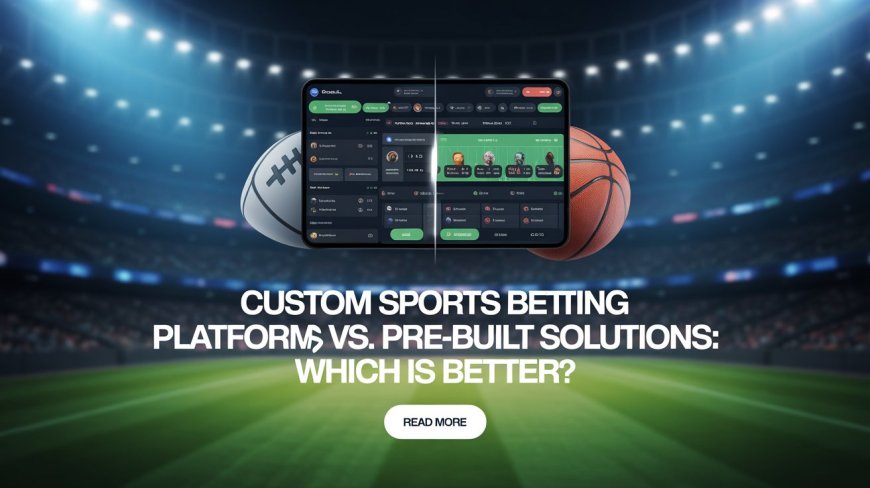Building a Custom Sports Betting Platform vs. Using Pre-Built Solutions
Compare the pros and cons of building a custom sports betting platform vs. using pre-built solutions. Learn which option suits your business goals and budget.

When it comes to launching a sports betting platform, you typically have two options: creating a custom solution from the ground up or opting for a pre-built platform from sportsbook software providers. Each approach has its unique benefits and challenges, and the decision largely depends on factors like your budget, timeline, and specific business needs. In this blog, we'll delve into the advantages and disadvantages of both methods to help you make the best choice for your sports betting venture.
Understanding the Basics
Before diving into the details, it's important to clarify what building a custom sports betting platform and using a pre-built solution mean.
Custom Sports Betting Platform
A custom sports betting platform is one that is built specifically for your business needs. This means developing everything from the ground up, including the software, design, and user experience. You work with developers, designers, and other specialists to create a system that meets your exact specifications.
Pre-Built Sports Betting Solutions
Pre-built solutions, on the other hand, are ready-made platforms provided by the best sportsbook software provider. These platforms are already designed, tested, and ready for deployment. You typically purchase or lease the software from a provider and then customize it to fit your branding and specific requirements.
Custom Sports Betting Platform: The Pros and Cons
Pros:
-
Complete Control Over Features
When you opt for a custom solution, you have full control over every aspect of the platform. This means you can decide which features to include, such as specific sports, betting types, payment gateways, and more. You can also have the platform designed to reflect your brand identity and user experience preferences.
-
Scalability
A custom-built platform is built to your specifications, which means it can be scaled as your business grows. Whether you're expanding to new markets or adding more sports and betting options, a custom platform can adapt to your evolving needs.
-
Differentiation from Competitors
Since the platform is entirely unique, you have the opportunity to offer features and functionality that stand out from your competitors. This can give you a significant edge in the highly competitive sports betting market.
Cons:
-
High Initial Investment
One of the biggest drawbacks of building a custom sports betting platform is the cost. Custom development requires a team of skilled developers, designers, and other professionals, which can result in a significant upfront investment. Additionally, the ongoing maintenance and updates also add to the cost.
-
Longer Development Time
Building a custom solution can take several months or even years, depending on the complexity of the platform. This means you may face delays before your platform can go live and start generating revenue.
-
Technical Risks
Developing a custom platform requires careful planning and execution. Theres always the risk of technical issues or bugs that can affect the user experience. Moreover, ensuring that the platform is secure and complies with regulations adds another layer of complexity.
Pre-Built Sports Betting Solutions: The Pros and Cons
Pros:
-
Faster Time to Market
The most obvious advantage of using a pre-built sports betting solution is that it significantly reduces your time to market. These platforms are already developed and tested, meaning you can launch your site much faster. This can be especially beneficial if you're trying to capitalize on a trending sports event or a new market.
-
Lower Initial Investment
Compared to building a custom platform, purchasing or licensing a pre-built solution is far less expensive. The software is often sold as a package, and you typically only need to pay a licensing fee or a subscription fee. This makes it an attractive option for startups or businesses with a limited budget.
-
Ongoing Support and Maintenance
Most sportsbook software providers offer ongoing support and maintenance as part of the package. This can save you time and money, as you wont need to worry about handling technical issues, security breaches, or software updates. The provider will take care of most of the heavy lifting.
Cons:
-
Limited Customization
While pre-built solutions offer some degree of customization, they often dont allow for the level of personalization you may want. You might find that certain features or functionalities arent available or are limited, which could hinder your ability to stand out from competitors.
-
Dependence on the Provider
When you use a pre-built solution, you're dependent on the sportsbook software provider for updates, fixes, and customer support. This means that if they experience issues or delays, it could impact your platform. Moreover, if the provider discontinues their service or goes out of business, you may be left scrambling to find a replacement.
-
Less Flexibility for Growth
Pre-built platforms may not be as easily scalable as a custom solution. If your business grows quickly or you want to expand into new sports or markets, you may encounter limitations with the pre-built system. This could require you to switch to a new platform down the road, which could be time-consuming and costly.
Integrating Sports Betting API: The Middle Ground
One solution that offers flexibility without the full commitment of building a custom platform is integrating a sports betting API. A sports betting API provider can offer you access to pre-built betting functionalities and data feeds while still allowing you to have some control over the user interface and platform design.
The Benefits of API Integration:
-
Access to High-Quality Data
When you integrate a sports betting API, you gain access to real-time sports data, odds, and event information. This data is typically accurate and up-to-date, which is crucial for providing your users with a competitive betting experience. By using a sports betting API provider, you can focus on the customer experience while leaving the data management to the experts.
-
Customizable Betting Experience
With betting API integration, you have the flexibility to design your platforms front-end interface while relying on the back-end API to handle the complex aspects of betting, odds calculation, and other critical processes. This allows you to create a unique user experience without having to build everything from scratch.
-
Faster Deployment
Integrating an API is much faster than developing a platform from the ground up. Since the API handles much of the heavy lifting, your development time is greatly reduced. This means you can launch your platform quickly and start generating revenue sooner.
-
Reduced Development Costs
By using a sports betting API instead of building every feature yourself, you can significantly reduce development costs. The API provider typically offers a subscription-based model, meaning you wont need to make a huge upfront investment in development.
Things to Consider:
-
Quality of the API Provider
When choosing a sports betting API provider, its important to research their reputation, data accuracy, and reliability. A poor API can lead to inaccuracies in odds or issues with performance, which can harm your platforms credibility.
-
Scalability
Ensure that the sports betting API integration you choose can scale as your business grows. Some providers offer APIs that can handle an increasing amount of data and transactions, while others may struggle as your platforms user base expands.
-
Customization Limitations
While API integration allows you to customize certain aspects of your platform, you may still be limited by the functionality provided by the API. Ensure that the features you require are included in the API package or that it supports third-party integrations for any additional features.
Which Option Is Right for You?
When deciding between a custom-built sports betting platform, a pre-built solution, or integrating an API, consider the following factors:
1. Budget
If you have a significant budget and are prepared to invest time and resources into building a one-of-a-kind platform, a custom solution may be worth the investment. However, if your budget is tight or you need to get up and running quickly, a pre-built solution or API integration could be the better choice.
2. Timeframe
Custom platforms take time to develop, whereas pre-built solutions and API integration can be deployed much faster. If you need to launch your platform in a short period, pre-built solutions or API integrations may be the best option.
3. Long-Term Goals
Think about your long-term plans for the business. If youre aiming to create a unique, differentiated platform that grows with your business, a custom solution offers greater flexibility. However, if you're looking for an efficient way to launch with reduced development effort, using an API or pre-built solution may be a better fit.
Conclusion
The decision to build a custom sports betting platform or use a pre-built solution depends on several factors, including your budget, timeline, and business goals. While a custom-built platform offers complete control and differentiation, it comes with a higher price tag and a longer development time. On the other hand, pre-built solutions provide a faster, more affordable option but may come with limitations in terms of customization and scalability.
By carefully considering your needs and resources, you can make an informed decision that aligns with your goals. Whether you choose to work with sports betting software providers for a ready-made solution or opt for a custom-built platform, the most important thing is to create a platform that delivers a great user experience and helps your business succeed.




































